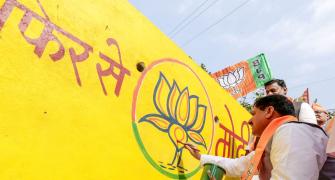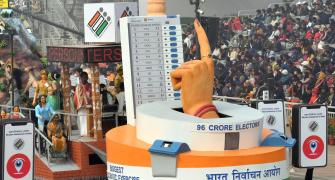A voter's right to know is 'far too important' in democracy than the privacy of a donor, Supreme Court judge Justice Sanjiv Khanna said on Thursday as the apex court scrapped the 2018 electoral bond scheme for funding political parties.

Justice Khanna minced no words when he likened quid pro quo arrangements between corporate donors and political beneficiaries of their largesse to 'money laundering'.
Penning a separate but concurring verdict, Justice Khanna quashed the scheme holding that it 'falls foul and negates and overwhelmingly disavows and annuls the voter's right in an electoral process as neither the right of privacy nor the purpose of incentivising donations to political parties through banking channels justify the infringement of the right to voters'.
A five-judge constitution bench headed by Chief Justice D Y Chandrachud, in its landmark verdict ahead of the Lok Sabha polls, scrapped the Centre's electoral bonds scheme, terming it 'unconstitutional' and ordering disclosure of the names of the purchasers, value of the bonds and their recipients.
Justice Khanna, in his 74-page judgment, gave reasons for annulling the controversial scheme launched six years ago.
"The voters' right to know and access to information is far too important in a democratic set-up," he said, deprecating the flow of unaccounted money to political parties.
"While secret ballots are integral to fostering free and fair elections, transparency -- not secrecy -- in funding of political parties is a prerequisite for free and fair elections. The confidentiality of the voting booth does not extend to the anonymity in contributions to political parties," he said.
He said the right to vote is a 'constitutional and statutory right', grounded in Article 19(1)(a) (freedom of speech and expression) of the Constitution, as the casting of a vote amounts to expression of an opinion by the voter.
"The citizens' right to know stems from this very right, as meaningfully exercising choice by voting requires information. Representatives elected as a result of the votes cast in their favour, enact new, and amend existing laws, and when in power, take policy decisions. Access to information which can materially shape the citizens' choice is necessary for them to have a say in how their lives are affected. Thus, the right to know is paramount for free and fair elections and democracy," Justice Khanna said.
Observing that political contributions for a quid pro quo may amount to money laundering, Justice Khanna held the scheme as 'unconstitutional' and ordered that it be stopped forthwith.
Concurring with the findings of the CJI, Justice Khanna set aside the amendments made in the Representation of the People Act, the Income Tax Act, the Companies Act of 2013 and the RBI Act which had paved the way for anonymous political funding through electoral bonds.
The apex court did not agree with the Centre's contention that matters of economic policy cannot be reviewed by the judiciary.
"I fully agree with the Chief Justice that the Scheme cannot be tested on the parameters applicable to economic policy. Matters of economic policy normally pertain to trade, business and commerce, whereas contributions to political parties relate to the democratic polity, citizens' right to know and accountability in our democracy," Justice Khanna said.
Justice Khanna dealt with the Centre's submission that donors of a political party often apprehend retribution from other parties or actors and so their identities be protected.
"I am of the opinion that retribution, victimisation or retaliation cannot by any stretch be treated as a legitimate aim. This will not satisfy the legitimate purpose of the proportionality test...," he said.
"This has to be checked and corrected. As it is a wrong, the wrong itself cannot be a justification or a purpose. The argument, therefore, suffers on the grounds of inconsistency and coherence as it seeks to perpetuate and accept the wrong rather than deal with the malady and correct it," he said.
Justice Khanna also rejected the argument that donors may like to keep their identity anonymous.
"When a donor goes to purchase a Bond, he has to provide full particulars and fulfil the KYC norms of the bank and his identity is then asymmetrically known to the person and the officers of the bank from where the Bond is purchased," he said.
Justice Khanna also noted that the RBI had objected to it on the ground that the bonds could change hands after they have been issued and, in fact, the scheme may enable the actual donor to not leave any 'traceability or money trail'.
He also dealt with aspects of money laundering in the judgement and said it can be undertaken in diverse ways.
"Political contributions for a quid pro quo may amount to money laundering, as defined under the Prevention of Money Laundering Act," he said.
Justice Khanna also referred to the observations made by the Financial Action Task Force that the signatory States are required to check money laundering on account of contributions made to political parties.









